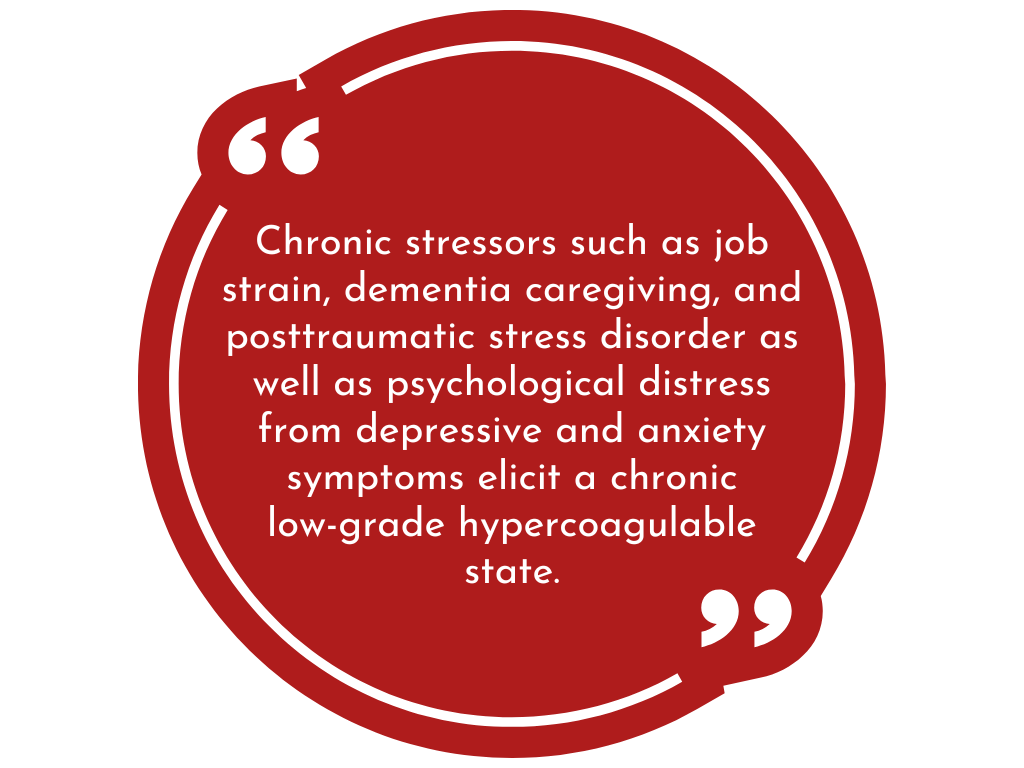Stress management plays a significant role in maintaining vascular health.
It’s also one of the hardest hurdles to get over as a blood clot survivor.
Stress as a risk factor for blood clots
Impact on Blood Pressure: Chronic stress can contribute to elevated blood pressure. High blood pressure is a risk factor for the development of blood clots.
Influence on Inflammation: Stress has been associated with increased inflammation in the body. Inflammation plays a role in the formation of blood clots.
Behavioral Factors: Individuals under chronic stress may adopt unhealthy coping mechanisms such as smoking, excessive alcohol consumption, or poor dietary habits. These behaviors can contribute to an increased risk of blood clots.
Blood Flow: Stress can affect blood flow patterns, potentially increasing the risk of clot formation. Relaxation techniques and stress management contribute to better blood flow, reducing the likelihood of clotting.
Immune Function: Chronic stress can suppress the immune system, making the body more susceptible to infections and inflammatory responses. A compromised immune system may indirectly contribute to clot formation.
Hypercoagulability: Stress has been linked to a state of hypercoagulability, where the blood is more prone to clotting.
Mental Health: Stress can negatively impact mental health, contributing to conditions like anxiety and depression. Mental health issues may, in turn, influence physical health, including cardiovascular health.
Recovery: For individuals who have experienced a blood clot, managing stress is crucial during the recovery process. Stress reduction contributes to a healthier recovery environment, minimizing the risk of recurrence and promoting overall healing.
Numerous naturalistic, experimental, and mechanistic studies strongly support the notion that—as part of fight-or-flight response—hemostatic responses to acute psychosocial stress result in net hypercoagulability, which would protect a healthy organism from bleeding in case of injury.
Sociodemographic factors, mental states, and comorbidities are important modulators of the acute prothrombotic stress response.
Stress and Hemostasis: An Update
WOMEN AND STRESS: UNIQUE CHALLENGES
Women, particularly those juggling multiple roles, may face unique stressors that can impact our overall health.
Work-related stress, family responsibilities, and societal expectations can contribute to chronic stress, potentially heightening the risk of VTE.
Hormonal fluctuations throughout a woman’s life, such as during pregnancy and menopause, may also play a role in the complex relationship between stress and VTE.
how the MENOPAUSE transition impacts stress
Hormonal Influence Estrogen, a hormone produced by the ovaries, has a wide range of effects on the body, including the regulation of mood, sleep, and stress response. The decline in estrogen levels during menopause can contribute to changes in emotional well-being and stress sensitivity.
Impact on Mood and Emotional Well-being: Hormonal fluctuations during menopause can lead to mood swings and increased vulnerability to stress. Some women may experience irritability, anxiety, or even depression during this time.
Stress Response: Changes in hormonal balance can affect the body’s stress response system. Stressors that might have been manageable before menopause can become more challenging to cope with during this period.
Sleep Disturbances: Menopausal hormonal changes can be associated with sleep disturbances, including insomnia or disrupted sleep patterns. Lack of quality sleep can contribute to increased stress levels and exacerbate other menopausal symptoms.
Physical Symptoms: Menopausal symptoms such as hot flashes and night sweats can be triggered or intensified by stress. Conversely, experiencing these symptoms can be a source of stress, creating a bidirectional relationship.
Psychosocial Factors: Menopause often coincides with other life transitions, such as children leaving the home or changes in career. These factors, combined with hormonal shifts, can contribute to increased stress levels.
Body Image Concerns: Changes in body composition and the aging process during menopause can impact self-esteem and body image, leading to emotional stress.
Coping Mechanisms: The ability to adapt to stressors can be influenced by hormonal changes. Women may find that their usual coping mechanisms need adjustment during menopause to effectively manage stress.
Individual Variability: The connection between stress and menopause varies among individuals. While some women may experience significant stress-related symptoms, others may navigate this life stage with minimal impact on their stress levels.
Chronic psychosocial stress and negative affect were also shown to exaggerate the acute prothrombotic stress response.
PMID: 25861135
It’s important to openly communicate with your healthcare providers about any stress, anxiety or emotional hurdles you are struggling with.
Together, find the best combination of lifestyle and medical interventions to help you manage your emotions and mental health.
